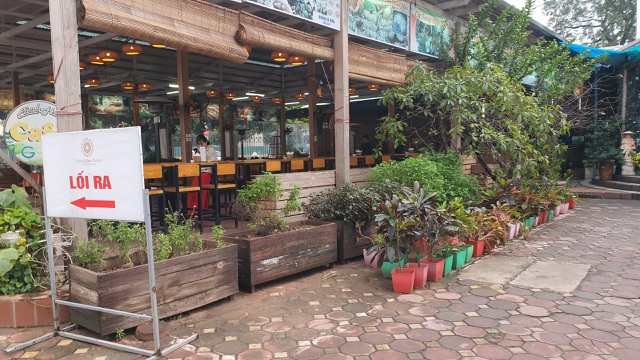 |
| Many shops near Truc Bach Street, Ba Dinh District in Hanoi, which was locked down after the 17th SARS-CoV-2 case was confirmed, have closed. Because of the impacts of coronavirus, small business owners are struggling. |
“I have noticed the effects of coronavirus on my business starting since the Lunar New Year,” she told Tiền Phong (Vanguard) newspaper as saying.
Hang said she had paid six months’ rent but couldn’t negotiate her payment down with the landlord.
“I stopped operations to cut losses,” she said.
Hang is not the only person affected by the virus and many small business owners are struggling.
Nguyen Khang, the owner of a milk tea shop on Cau Giay Street, had to shut his shop due to a lack of customers.
“On a short stretch on Cau Giay Street there are five milk tea shops that have been closed down or are available for lease,” he told the newspaper.
Tran Thi Yen, 42, who lives on Thuy Khue Street, said her family decided to buy food and cook at home instead of going out to prevent the spread of the virus.
“I used to take my children to fast food restaurants or meet with my friends at the weekend. However, since the outbreak of COVID-19, we afraid of meeting people outside,” she told Việt Nam News.
Nguyen Lan Anh, the owner of a pho (noodle) restaurant on Nguyen Van Loc Street, said over the past three weeks many people have avoided eating and drinking out.
She used to welcome an average of 100 customers daily, but since the coronavirus outbreak, she averages 30 to 40.
Anh claimed her restaurant has seen its revenue fall by 50 per cent and she even had to let some staff go as she couldn’t afford to pay all of them.
Streets like Nguyen Trai, Tay Son, Chua Boc and Hoang Cau which have a large number of shops, have also witnessed the effect of the coronavirus on business.
“Many shops have been closed or are for rent as their revenues have fallen since the post-Tet (Lunar New Year) period,” said a shop owner who wished to remain anonymous.
It's common to see 'Shop closed' or 'For rent' on the streets.
In response to the desperate situation, Vincom Retail Joint Stock Company announced a programme worth VND300 billion to help businesses that lease spaces at the company’s 79 commercial centres across the country.
According to real estate experts, rents for commercial spaces in inner-city Hanoi were too high.
Many business owners wanted to rent space with a good location but their revenue had fallen due to the epidemic.
A similar situation has been reported in HCM City.
Phan Xich Long Street, which houses a lot of restaurants and cafes, has seen few customers in the past month and many firms have vacated their premises.
Vu Dinh Toan, the owner of Lộc Vừng seafood restaurant, said it had lost about 90 per cent of revenue over the past month.
“At first we asked our staff to temporarily leave but then we decided to close the restaurant and find someone who is willing to lease,” he said.
“Customers avoid eating out since the outbreak of COVID-19,” Toan said.
The owner of a café in Phu Nhuan District’s Hoa Su Street said as soon as the rental contract finished, he found a space with lower rent although it was a little far from the city’s centre.
In addition to having few customers in the past month, the rental fees were too high, he said, adding that it was between VND110-150 million per 100 sq.m for a shop. — VNS

Restaurants suffer downturn amid coronavirus fears
Many restaurants in Hanoi, which have been hit by the new fines on drink driving, have experienced a further fall in customers amid the fears of coronavirus.

More people shopping online due to coronavirus
To cope with the threat of coronavirus, many in Ha Noi are choosing to shop online or order food at home instead of facing crowds at brick and mortar stores and restaurants.

How will the coronavirus affect Vietnam’s economy?
Bao Viet Securities (BVSC) predicted that the GDP would grow by 6.5 percent in Q1 2010, or 0.2-0.4 percent lower than the same period last year. The growth will recover in Q2.
 Nguyen Minh Hang, the owner of a clothing store on Quan Thanh Street in the capital city of Hanoi, has decided to temporally suspended operations due to the outbreak of the novel coronavirus disease (COVID-19).
Nguyen Minh Hang, the owner of a clothing store on Quan Thanh Street in the capital city of Hanoi, has decided to temporally suspended operations due to the outbreak of the novel coronavirus disease (COVID-19).